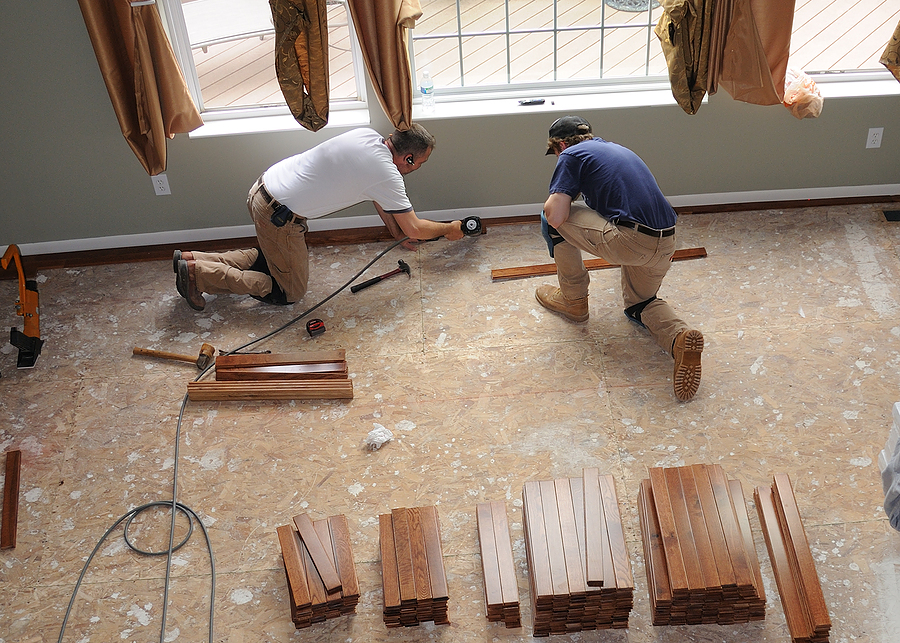If you have been watching the Canadian real estate market and seeing prices go through the roof, you have probably wondered if you are not missing a trick by not investing in a few properties yourself. Flipping houses is an especially hot trend right now.
Before you cash out all your investments and go all-in on flipping houses for profit, know that it’s not all sunshine and rainbows. Like all other investments, you can lose money if you don’t do your homework.
We prepared this short guide to help you understand what flipping houses is and the factors you need to consider before buying that fixer-upper for flipping.
What Is House Flipping?
House flipping is where you buy an old, distressed house and repair and update it with the intention to sell it at a profit. ‘Flipping’ itself refers to the process of repairing, renovating a house to bring it up-to-date with current trends and at times to add square footage and features that make it livable and more appealing to buyers.
When the time comes to resell the house, you want the total spend from buying the property, renovation costs, and any applicable fees and taxes not to exceed the expected value after repairs. Now, in a market such as Toronto where home prices are going up all the time, your chances of selling at a profit are conceivably good.
Many beginners will take out a mortgage loan to finance a house purchase. If that’s you, you need to find a mortgage broker that understands this business and your local market as a first step.
The second and perhaps better option is to deep into your savings and pay cash for the house, the renovation/repair, and all the other costs involved.
With so much money on the line, you have to know what you are doing for a flip to be profitable. Here’s what you need to keep in mind before you start flipping houses:
What You Need To Know Before Buying A House To Flip
There’s money to be made flipping houses. But one thing you need to know, though, is it’s not as easy as they make it look on HGTV. There is a lot of work and money involved, some of which can go down the drain if you don’t take note of the following:
1. Flip With a Target Buyer in Mind
The best way to approach flipping houses is as you would any other business. You start with a customer need in mind and then work out how to satisfy it in a way that is profitable to you. In this case, the need you are hoping to meet is that of suitable, affordable housing for a specific type of home seeker.
If you blindly buy and renovate properties without any idea who your potential buyer is, your chances of success are slim. The flip can take too long to sell, resulting in you incurring carrying costs that will eat into your profits. In the worst-case scenario, you may be stuck with an expensively renovated house that no one wants to buy.
So you need to identify a target buyer first to get an idea of the type of house you need to flip. This could be old couples downsizing to a smaller property or young professionals looking for a family-size home to plant roots. These people prioritize different features and amenities in a home. Also consider a specific location’s proximity to schools, shopping, health facilities, sports and entertainment venues, and clubs.
2. Draw a Realistic Budget
With a clear idea of the type of house and location you have to shop in, you can now draw up a realistic budget for this flip. Because you have profiled your target buyer and know which features are important to them, you can know the first time you inspect a potential flip house what renovations it will need and how much it will potentially cost.
It is quite easy to neglect some costs, which can only derail the project and cost you money later. The obvious costs will be the property’s purchase price and the renovation costs. But there are other costs involved in a house flip, like building permit fees, capital gains tax, staging and other selling costs.
Unless you already have a buyer waiting in the wings, you also have to budget for the house’s carrying costs. These are the costs that a homeowner pays, including the mortgage, utilities, property taxes, insurance, and general maintenance. You pay carrying costs as long as the house remains unsold, so you must have an allowance for them in your budget.
3. Know the True Renovation Costs Before Buying a Fixer-upper
The savviest house-flippers are those that can identify homes that only need a few repairs and cosmetic touch-ups to bring them up to date. The less you spend on repairs the better your chances of turning a profit.
If you spend a lot on the renovation, the problem is the house will be too expensive than buyers are prepared to spend for houses in that neighbourhood. This point highlights the need to engage a knowledgeable contractor.
An experienced contractor will know after a careful inspection how much work and investment it will take to bring a house to a livable, modern condition. A wall may need to be knocked out, windows enlarged, the roof raised, and floors replaced to improve energy efficiency and ease of maintenance.
Just recently, Canada experienced a crippling lumber shortage that saw prices rising to record highs, so always factor in changing market conditions when going into this business.
A good local contractor will have a better understanding of the current prices of materials and the general logistics of carrying out a renovation like the one you are planning. So resist the urge to go the DIY route and hire an experienced local contractor.
4. The 70% Rule
There should be no room for sentiment when reviewing houses for flipping. No matter how good the location is and how much demand there is for that type of house, do not overpay on the purchase price.
The 70 percent rule of flipping houses is when buying a fixer-upper, you should not pay more than 70% of the after repair value (ARV – the home’s value after it’s repaired) minus the repair costs. Pay more than 70% APV and your chances of selling at a profit or recouping your investment reduce.
5. Flipping Houses Requires a Significant Time Investment
As well as capital, it takes a significant amount of your time to find a house to flip, renovate, and sell it. It could be months before you close a sale on your flip.
Even where you have hired a good contractor to do the renovation work, you will still need to manage them to ensure the work finishes on time. It’s worth sitting down and considering if you will have enough time to manage the flip, especially if you have a full-time job.
Finding the right property can also be a game of patience. You have to have the fortitude to wait as long as it takes to get the right property. With more flips, it will get easier to identify houses to flip and negotiate good purchase prices.
6. Hire the Right Skills
We have already talked about the importance of engaging an experienced local contractor. We should probably have led with how critical it is that you work with an experienced local real estate agent.
To succeed with flipping houses, you need to first identify and acquire the right property. A real estate agent with local experience will know how to pick the right property, in the right neighbourhood, and at the right price.
A realtor also knows the taxes applicable to your real estate investment, can tell at a glance if a property can be flipped successfully, and what features the renovation must prioritize.
Is Flipping Houses Profitable In Canada
The flip-for-profit business is growing rapidly in Canada. You would therefore assume people are driving good returns from it. The market conditions are certainly right for the business, seeing that there is a general shortage of available houses, even as prices keep rising.
Again, you need to do your homework. Just as there are people profiting from flipping houses there are many who are losing money. When starting out, concentrate on buying, renovating, and reselling one property at a time and slowly build your knowledge and experience.
Your goal at first should not be to maximize profit but to sell as quickly as possible to minimize risk to your capital.
Where To Find Experienced Local Realtors And Contractors
The secret to making money flipping houses as a beginner is building a team of capable local professionals who will plug your skills gap. A core team will have a go-to mortgage broker, real estate agent, and experienced contractor.
In Canada, the safest place to find these skills is on the Souqh real estate and home services market. Besides these professionals, you can also search Souqh for painters, real estate lawyers, plumbers, and all manner of real estate-focused services and contractors.The 70% Rule






